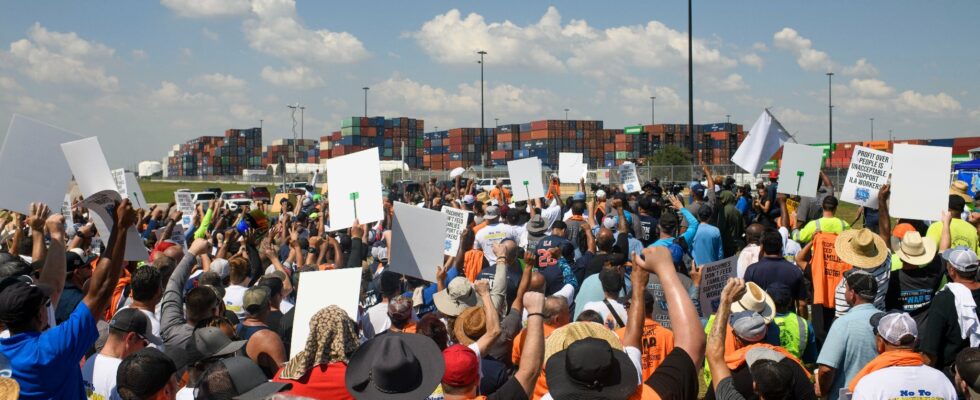An agreement was finally reached: American dockworkers will return to work after three days of strike, the union and employers announced Thursday, October 3 in a joint press release. “From now on, all ongoing actions will cease and all positions covered by the framework contract will resume,” indicate the dockers’ union (ILA) and the United States Maritime Alliance (USMX), which represents their employers. They declare that they have “concluded an agreement in principle on salaries”, without further details. But, according to the Wall Street Journal which cites people familiar with the matter, employers proposed a 62% wage increase over six years, which was accepted by the union.
The two parties will, however, have to resume discussions, because they “agreed to extend the framework contract until January 15, 2025 in order to return to the negotiating table to negotiate all other outstanding issues”. “They have the next 90 days to put everything in place,” Joe Biden told reporters Thursday evening, back at the White House. The American president had, shortly before, welcomed this agreement in a press release, which will make it possible to “reopen the ports of the East Coast and the Gulf”, and “represents crucial progress towards a solid contract”. He also thanked “the union workers, transporters and port operators who are acting with patriotism to reopen our ports and ensure the availability of essential supplies for recovery and reconstruction following Hurricane Helene.”
The “living force” of the country
Some 45,000 members of the dockworkers’ union (ILA) have been on strike since Tuesday in 36 ports of the United States Maritime Alliance (USMX) on the East Coast and the Gulf of Mexico, for lack of agreement on a new social agreement six years old. This averages over $2.1 billion in business value per day, according to multiple sources. This agreement actually only concerns 25,000 union members working in the container and vehicle import/export terminals of 14 major ports (including Boston, New York, Philadelphia, Baltimore, Savannah, Miami, Tampa, Houston).
Joe Biden refused to intervene in the conflict. The White House spokesperson said it was “time for the USMX to negotiate a fair agreement with dockworkers that reflects their important contribution to our economic recovery.” Former President Donald Trump, who is seeking a new term, estimated in Milwaukee that Joe Biden “should have worked on an agreement between them” and noted that dockworkers represented “the living force” of the country.
Now one month before the November 5 election, this strike threatened to cause shortages and fuel inflation. The carriers, forced to reroute their boats, had planned to apply surcharges: an additional $1,000 per container for the German shipowner Hapag-Lloyd, between $800 and $1,500 for its French competitor CMA CGM, according to the German logistics platform Container xChange. And up to $3,780 for the Danish giant Maersk, according to analysts at TD Cowen. At the same time, prices increased towards destinations where there was no strike.
